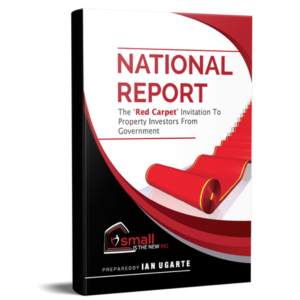Land tax is not something that’s typically been top of mind for me as an investor.
But proposed changes to the Land Tax Act 2010 (Qld) announced in the December 2021 budget update put it front and centre – for anyone buying investment property. According to the update, assessment of Queensland land tax liability would start to take into account the value of ALL interstate landholdings.
So prior to 1 July 2023, if you owned say $300,000 worth of Queensland property, you were exempt from tax, whatever land you owned in other states (the Queensland threshold being $600,000 tax free for individuals other than absentees and $350,000 for companies, trustees and absentees).
But after 1 July, if you also owned $1 million worth of property in another state, you’d be considered to own $1.3 million worth of taxable property — rather just the $300,000 worth of property in Queensland, and be taxed as such.
Not a popular move. Unsurprisingly, on 30 September, Queensland Premier Annastacia Palaszczuk announced the government was scrapping the controversial proposal.
SCROLL DOWN to find out why the proposal was scrapped and what it means for property investors.

So why the proposed changes?
The new measures were a revenue raise in a way that no state had dared try before, and frankly I’m surprised it hadn’t happened earlier.
The Queensland Treasurer said it was designed to close a land tax ‘loophole’ that allowed investors to avoid tax by buying investment property across jurisdictions and below their thresholds. Now I wouldn’t call it a loophole as such, but yes, Queensland is one of the go-to states if you want to exclude yourself from land tax. If you purchase using some real-estate smarts, you can stay below the land tax threshold for every property you own, and never have to pay land tax.
What I mean by that is buying each of your properties through a separate corporate trustee in a trust, giving you a separate threshold for each entity. I recommend this for all INVIDA clients. Apart from anything else, there are inherent tax minimisation and asset protection benefits.
Would these kinds of tax laws really help home buyers and renters?
The Queensland government said they were implementing the change to improve housing affordability. The idea was that by deterring investors from buying in Queensland, it would reduce competition among buyers and help aspiring homeowners. That in turn would lead to a decline in housing prices.
I think if the new laws had gone ahead, there might have been a short-term murmur of: “no-one’s going to buy in Queensland”, but it wouldn’t have stopped people from coming. It’s still good value in Queensland. People are migrating here and people always see better investment opportunities at this point of the cycle in Queensland, especially in south-east Queensland.
They would have continued to come and invest here, but just accounted for the fact that they might have to pay more land tax depending on the structure they buy in. And there are plenty of calculators online that will allow you to run those numbers.
And the bottom line is, our market is still undersupplied
In Australia we’ve got a 0.9% national vacancy rate – tiny. The Gold Coast average rental has lifted 43.3% between June quarter 2012 and mid 2020, the second highest in the country. The Sunshine Coast is up by 34%. These are harsh increases caused simply by the laws of supply and demand.
In this climate, you will not see a significant drop in housing prices. Perhaps some minor drops because of interest rate changes but it’s only going to be short term. Until there’s a housing oversupply, prices will not be substantially affected.
And as for helping with housing affordability for renters, many in the industry believe the burden of the extra tax costs, for existing owners, would have been passed on to renters. Meanwhile housing advocacy, homelessness and renter groups pushed back against those claims.

What investors can take away
There are two things that have been reinforced for me through this whole tax shake-up.
1. Always buy investment properties in the right legal structure
At the time when the new tax laws were proposed, there was no absolute clarification from the Queensland government about whether individual tax thresholds would still apply to properties if people were buying investment property in individual legal structures. I couldn’t find information anywhere and no-one could answer the question, not even my mate and INVIDA Mastermind student, Brian Happ, who’s done a lot of research in the area.
We don’t know what’s going to happen in future, in Queensland or any other state that might be getting ideas about this. There’s no guarantee a legal structure will protect you. But I’d certainly say that buying investment properties in structures you’ve got a better chance of not having to look at an assessment from interstate. Because the structure buying your Queensland property doesn’t own anything interstate.
A lot depends on whether the tax office will go to the effort of looking behind the corporate trustee and the trust, finding out who directors are, and grouping the directorships of the corporate trustees together. It sounds like an administrative nightmare to me.
It also depends on whether other states co-operate. We saw the NSW Premier Dominic Perrottet come out on 26 September to say New South Wales wouldn’t provide data enabling land taxes to be imposed on NSW investors with Queensland property holdings.
2. Land tax is a cost of doing business
At INVIDA we always cater for land tax as a cost of doing business. With a co-living property, you’re generally going for a cash flow investment along with a number of other benefits. If your cash flow is not going to cut it after land tax, then you need to look at a different strategy.
Property is a long-term play. People go where the value is. Ultimately, if you pay what you need to pay in land taxes, whatever that may be, and you know that within 10 years your property price will double, you’ll still be in a really great position, land tax aside.
JOIN MY UPCOMING WEBINAR to learn more about how INVIDA co-living cash flow positive properties can get you to your financial goals sooner! Register HERE.







